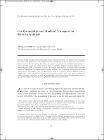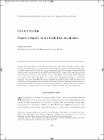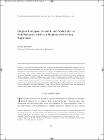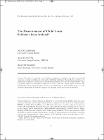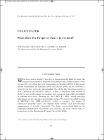Browsing The Economic and Social Review, Vol. 41, No. 1, Spring, 2010 by Title
Now showing items 1-6 of 6
-
Car ownership and mode of transport to work in Ireland
(Economic & Social StudiesDublin, 2010)Rapid economic and demographic change in Ireland over the last decade, with associated increases in car dependence and congestion, has focused policy on encouraging more sustainable forms of travel. In this context, ... -
Negative equity in the Irish housing market
(Economic & Social StudiesDublin, 2010)Having peaked in early 2007 Irish house prices have fallen steadily. Negative equity occurs if house price falls result in the house value being lower than the outstanding debt. Many in negative equity will be unaffected ... -
Output collapse, growth and volatility in Sub-Saharan Africa: a regime-switching approach
(Economic & Social StudiesDublin, 2010)A Markov-switching model with time-varying transition probabilities is applied to sub- Saharan African data to examine the link between output collapses and growth. In the model, the growth rate moves discretely between ... -
The measurement of child costs: evidence from Ireland
(Economic & Social StudiesDublin, 2010)We apply an extension of the Rothbarth approach to estimate the share of household resources accruing to children (i.e., the cost of children) in Ireland. The method also allows us to identify the economies of scale in ... -
What role for property taxes in Ireland?
(Economic & Social StudiesDublin, 2010)What role could a property tax play in broadening the Irish tax base? An annual tax on property has been recommended in a series of reports over the past 25 years, from the first Commission on Taxation (1985), to the recent ... -
When do Probit residuals sum to zero?
(Economic & Social StudiesDublin, 2010)Probit residuals need not sum to zero in general. However, if explanatory variables are qualitative the sum can be shown to be zero for many models. Indeed this remains true for binary dependent variable models other than ...




